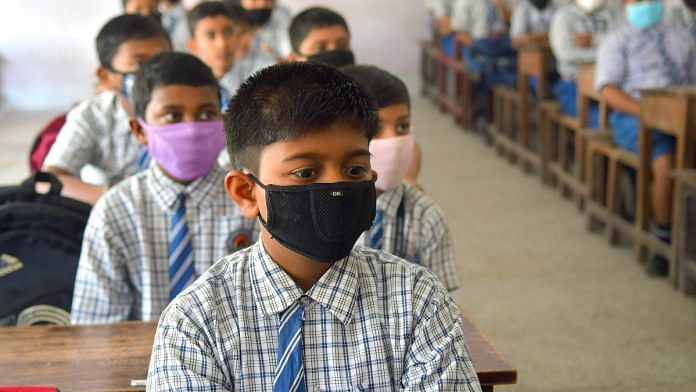New Delhi: Television is all set to be the new lockdown classroom for school students as the government looks to address concerns about internet lessons among the economically disadvantaged and those living in remote parts of India.
The Union Ministry of Human Resource Development (HRD) is coming up with a programme that will see the lessons for each class from 1 to 12 shift to a dedicated channel, ThePrint has learnt.
As a normal school day progresses through different periods, so will the classes on TV, according to the “one class one channel” proposal drawn up by the ministry.
The proposal was shared with the National Council for Educational Research and Training (NCERT) through an official communique dated 4 May.
In the letter, which has been accessed by ThePrint, the Department of School Education and Literacy has asked NCERT officials to keep class-wise and subject-wise content ready for classes 1 to 12 for “at least a week”.
The content, it adds, will be telecast on the 12 ‘Swayam Prabha’ channels that the ministry has on Direct-to-Home (DTH) platforms such as Airtel and Dish TV. The initiative will be part of a larger ‘PM e-vidya’ package, the ministry has stated.
The NCERT has been asked to keep the content ready on an urgent basis as the government plans to launch the programme soon.
“As you are aware that Department of School Education and Literacy has been assigned twelve Swayam Prabha channels for imparting online/digital education to students across the country,” the department says in the letter.
“The PM e-Vidya package may soon be launched, in which a major announcement would be ‘one class one channel’ on Swayam Prabha. In this context, it is important that class-wise and subject-wise content and schedule for classes 1 to 12 may be kept ready at the first instance for at least one week and subsequently content may be added for the following weeks,” it adds.
Also Read: Who goes online to study in Covid times? 12.5% homes of Indian students have internet access
‘A virtual classroom’
Schools across India were shut down mid-March as the government looked to check the spread of Covid-19.
Since the ensuing lockdown has coincided with the dates that schools launch their new academic sessions, in the first week of April, the government encouraged schools to launch online classes.
However, the online lessons have proved a difficult proposition for poorer students who don’t have smartphones and powerful internet, as well as those in remote areas with patchy connectivity.
Virtual lessons are being imparted through Swayam Prabha channels currently as well to supplement online classes, but they are more broad-based and cater to a particular age group, rather than a class. For example, there is a channel called Kishor Manch dedicated to teenage students, and another meant for primary-level students.
The new initiative seeks to address this problem by dedicating one channel to each class and airing subject-wise lessons. The serial number of channels and the subject-wise schedule will be fixed and circulated in advance, so that students know which channel they need to tune into.
“If a student is in Class 5, he will need to follow a channel dedicated to that class and follow subject-wise lessons on that channel,” a senior official in the HRD ministry said. “It will be like a classroom, with a set schedule and timetable, just that it will be virtual,” the official added.
Also Read: ‘Our kids will be left behind’ — parents in UP’s Hardoi say no smartphone means no e-classes



